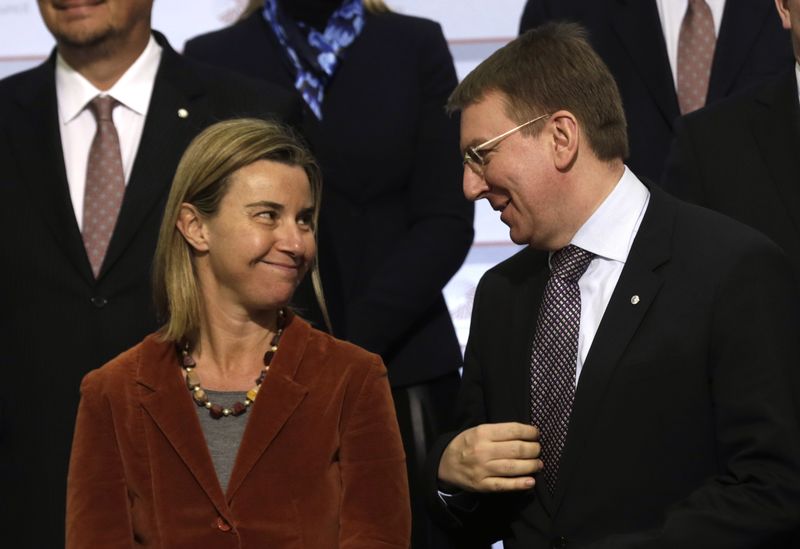By Alastair Macdonald
RIGA (Reuters) - European Union meetings in Riga last week were heavy with the historical symbolism EU leaders turn to for relief from economic malaise, terrorism or fears of Russia.
EU chief executive Jean-Claude Juncker hailed the start of Latvia's first turn as chair of ministerial councils since the small, ex-Soviet state joined the bloc a decade ago, calling it a completion of Europe's "reunification" after the Cold War.
But in a city built by the Teutonic Knights on their fire-and-sword crusades to convert the peoples of the east, it was hard not to detect a modern missionary zeal in Latvian plans to spread "European values" beyond the EU frontier - and challenge Moscow on what they call its propaganda war against the West.
A focus of their six-month presidency is a summit in May on the bloc's Eastern Partnership, a programme to strengthen ties with other former Soviet republics. A similar meeting in 2013 in Lithuania sparked a crisis when Russian President Vladimir Putin sought to prevent Ukraine slipping further from Moscow's orbit.
"We definitely don't see our presidency as anti-Russian," Latvian Foreign Minister Edgars Rinkevics told reporters.
Yet his list of targets for closer EU ties included not just Ukraine, Moldova and Georgia but states hitherto friendlier to Moscow, such as Armenia, Azerbaijan and in Central Asia - not to mention the West's old bugbear Belarus. The eastern strategy should even stretch all the way to Afghanistan, he said.
EU leaders say Russia is wrong to fear "encirclement." But Rinkevics, who is on what he called a "reconnaissance mission" for the EU in Kiev and Moscow this weekend, may struggle to convince the Kremlin that the hitherto hawkish Latvian government can help wind down the East-West rhetoric.
TELEVISION WARS
Having long accused Moscow of agitating among a 30 percent Russian-speaking minority that is wary of Latvians who see it as an unwelcome relic of Stalin's annexation, the Riga government plans to take the offensive against Kremlin-backed media.
"Propaganda against the EU, the U.S., our way of life ... has become so intense," Rinkevics said, that Latvia and its allies are studying a new "strategic communications" plan. It may include launching a television channel that could compete with Kremlin-financed entertainment networks which carry news.
"We will try to get our message across," he said, while dismissing any suggestion of seeking "regime change" in Moscow.
Viktors Makarovs, a Russian-speaking aide to Rinkevics, is working with the EU-funded European Endowment for Democracy in Brussels as well as governments that include Germany and Poland, Nordic and other Baltic states on a study that could end up with proposals to EU leaders before Latvia's presidency ends in June.
He and Rinkevics reject the notion of simply beaming back "counter-propaganda" against Putin. They also acknowledge that broadly independent news is available to Russians who seek it.
But an option to reach a mass audience may be the kind of big-budget TV that Moscow offers, in which news is slotted in between ratings-grabbing entertainment: "Do we sit still and do nothing?" Makarovs asked. "Or do we offer an alternative?"
Prime Minister Laimdota Straujuma also spoke of a threat from Kremlin media influence, relating her own experience as a viewer. But despite ambitions to share with fellow ex-Soviet states the hard-won experience of joining the EU, Straujuma doubted all states would fund a new Russian-language channel.

Admitting to fears last year that Russia might move against Latvia, Straujuma was placing more faith in the armies of the West than in converting Russians to embrace the EU: "NATO membership," she said, "is the guarantee of our security."